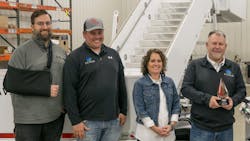Stinar LLC: 2022 Product Leader of the Year
Ground service providers at FBOs and smaller, regional airports have the same GSE needs as larger operations, just not to the same scale.
Stinar LLC supports this segment of the ground handling industry with right-sized equipment.
“They don’t need a 350-gallon lavatory truck to service two GVs. So, one of our little 150-gallon lav and potable water carts is a good size for them, and it works,” explains Stinar CEO/CVO Craig Kruckeberg.
However, he noticed this smaller equipment was often being towed by larger tractors. So, Stinar’s team of engineers set out to find a solution. The result was the company’s line of modular units.
Customers can place a potable water unit, lavatory service unit, maintenance box and more on top of either a modular chassis or modular wagon to suit their individual needs.
“The modular unit provides flexibility to service providers in offering an interchangeable service vehicle capable of handling all kinds of different tasks that ground service providers encounter day in and day out,” says Jason Johnson, vice president of business development at Stinar.
Stinar began developing the modular units in the spring of 2021 and had prototypes completed and ready to display later that year at the International GSE Expo and NBAA-BACE.
For developing its flexible solution and presenting it to FBO, regional airport and MRO markets in less than a year, Stinar LLC has been named the Ground Support Worldwide 2022 Product Leader of the Year.
A Solution for FBOs
Stinar has a reputation for building large GSE units, like passenger stairs, maintenance lifts, vehicles for passengers with reduced mobility (PRM) and more, Kruckeberg explains.
But when he acquired the company in 2019, Kruckeberg entered the GSE market with fresh view.
“Everyone wants to build the big stuff. I’m seeing less and less people building, what I would call, the basics,” he says.
Inspiration struck when Kruckeberg was traveling through Florida. While stepping off an aircraft, he saw one of Stinar’s lavatory carts being pulled by a lawn tractor with the mower deck taken off. If that ground handling staff didn’t utilize a large tractor to tow the cart, he figured other FBOs may be looking for a similar solution.
Identifying FBOs as an under-tapped market, Stinar partnered with Polaris and Taylor-Dunn Manufacturing to develop a vehicle that its carts could mount on.
“We redesigned our lavatory carts and our potable water carts to fit on these units, (and) married them together,” Kruckeberg says. “If you take the wheels off our carts, it actually drops on the back of these chassis.
“It’s made things a lot faster and smoother for us,” he adds. “We already have the carts – we’ve had the lav carts and the potable water carts and everything. We just needed a power unit to put under it.”
The power unit is also capable of pulling equipment, such as Stinar’s wagon. The modular wagon unit can accept the same carts and accessories the chassis can.
“With our system, you don’t need a tug. You’ve got the power unit, and you could put a maintenance modular system on the power unit. Then if you want to pull the potable water unit at the same time, you can,” Kruckeberg says. “Or, if you don’t want to pull anything – there’s a lot of people that don’t want you pulling anything around their aircraft – you just swap it out and drive right up to it with a small, electric unit.”
To develop its modular units further, Stinar is working to build its own modular chassis in-house.
The company, which had been located in Eagan, Minn., has relocated to Blooming Prairie, Minn., where its 22 employees are operating out of a 65,000-square-foot facility built and designed for manufacturing.
“We have the ability, with our new facility, to start building our own chassis,” says Kruckeberg, noting the company plans to add another 55,000 square feet in the spring of 2023.
Key Features
Stinar has developed modular potable water, passenger transport, maintenance, lavatory service, refuse and flush and fill units to fit their chassis and wagon. This allows most ground service at FBOs and regional airports to be performed, Johnson explains, adding the versatility of an interchangeable system provides value to customers.
“I think of it like a cell phone charger. When you buy a cell phone, you’ve got your plug that you plug into the wall, and then you get all the different adapters because every new phone out there is making proprietary plug-ins. It’s nice just to have the one plug-in with the multi-tipped end,” Johnson says.
“We’ve really got the plug-in, which is our unit – our chassis or our wagon, and we’ve got the multi-tips with our baggage carriers, our lavatory and water carts, our stairs, our lifts,” Johnson says. “It’s exciting to see what this is going to bring to us.”
Kruckeberg adds the possibilities for Stinar’s modular units are nearly endless and the company’s engineers continue to develop additional modular options.
“We’ll be able to put a 16-foot scissor lift on our chassis because of the profile and the size,” Kruckeberg notes as an example.
He adds that whatever need a ground handler may have at an FBO or smaller airport, Stinar will be able to address most of those needs with the modular unit.
“We’re just shrinking it down. We’re just miniaturizing it,” Kruckeberg says.
While the original chassis for the modular unit offered an electric drivetrain, developing its own chassis will allow Stinar additional flexibility.
For example, where cold weather isn’t as conducive to electric equipment or where charging infrastructure is unavailable, Stinar will provide a diesel- or gasoline-powered chassis for those customers.
The modular units also include a number of safety features.
Nuts are welded to the unit to avoid creating foreign object debris (FOD) on the ramp. Proximity sensors and switches are included to prevent GSE collisions with aircraft. Back-up cameras and interlocks on stabilizers and cylinders provide additional safety.
“We have that technology now in all of our truck chassis,” Kruckeberg says. “All that technology is there. It’s all available, we just miniaturized it all down into these little chassis.”
What’s more, the modular units are well lit for overnight tasks and the chassis is built to assist drivers.
“It’s easier for them to see around themselves,” Johnson says. “And the turning radius you get, in of itself, on the smaller, miniaturized chassis, it’s just easier to operate. It’s more comfortable. You’re not in a bigger unit with blind spots.”
Pointing to the quality of materials used to build the equipment, Kruckeberg says the life expectancy of the modular units can likely be measured in decades. For example, smart-chargers extend the life of batteries, stainless steel provides more durability for the tanks and powder coat paint offers a higher quality finish.
“The longevity of Stinar equipment, we carry that into the modular also,” Kruckeberg says, noting Stinar has always built reliable equipment by over-engineering.
“We’ve just basically taken ground support equipment and miniaturized it to allow the other airports – the FBOs and regionals – to have the same attributes that the big airports have,” he adds.
“It really started with an idea from travel. That’s where we saw a lot of it, from our own travel experiences. And then talking with different customers about what we could help with,” Johnson says. “We started the innovation in a round-about, weird way. We used a prototype, and now the ultimate goal is to make a Stinar self-propelled alternative-fueled vehicle. Or a traditional fuel, with a gas or diesel engine.
“We’re proud of this whole thing that we developed in a record time when we had a new team.”
About the Author
Josh Smith
Editor
Josh Smith served as editor of Ground Support Worldwide as editor from 2016 through 2024. He oversaw production of the print magazine, created GSW's newsletters on a daily basis, and updated the latest news on AviationPros.com.

